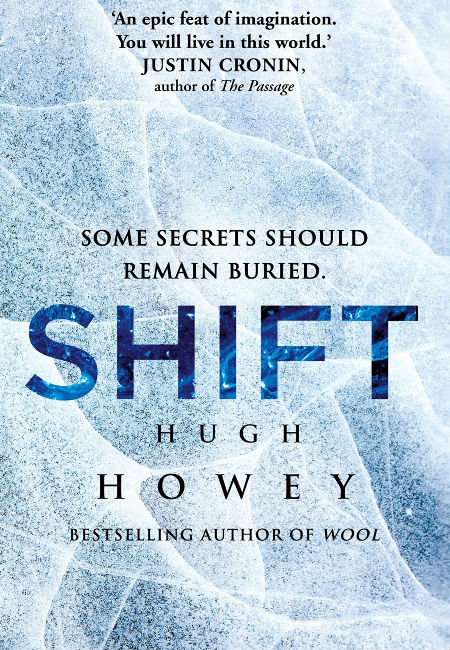
Mankind is a contrarily unique species.
Armed with ferocious intelligence, tenacity, ambition, and the ability to remold the world, for better or worse, we hold both the seeds of our uplifting and our downfall in our often overly confident hands.
Peter may build up, but Paul will tear down, and caught up in the hubris of the next great progress-defining accomplishment, we often to fail to see what we have done to ourselves until it is too late.
It is a constant theme in dystopian, apocalyptic literature, but never more so than in Shift, the recently-released prequel to Hugh Howey’s spectacularly successful Wool.
Like Wool, Shift was released as a series of e-books – in this case three (as opposed to Wool‘s five) First Shift- Legacy, Second Shift – Order, Third Shift – Pact – before making it into print, part of a new trend of publishing houses watching what succeeds in the virtual publishing world before offering deals to do a “real world” print run.
While it was released after the book that made Hugh Howey’s name, it functions as a prequel and frighteningly chilling one at that.
Never was a blurb on a book cover more accurate:
“An epic feat of imagination. You will live in this world.” Justin Cronin, The Passage
From almost the word go, you are drawn completely and absolutely into the world of the silos, bouncing backwards and forwards through time between 2049 when planning for these last stands of humanity began through to 2110 when a character called Troy awakens from the deep sleep that occupies many of the workers in the Silo 1 in between their six month long shifts through to 2345 when a much-delayed bittersweet resolution of sorts take place.
Hugh Howey succeeds where many fail in creating a world that made sense to me.
From its origins in the murky world of power politics and international relations through to its slowly-unfolding breakdown centuries later, where both the material and social decay becomes too obvious to ignore, Shift is a world that exists with a life of its own, populated by characters whose motivations are understandable and real.
And that I think is what it so chilling and prescient.
Told from the point of view of protagonist Donald, a freshmen congressman in Washington DC in 2049 who is seconded to a top secret project by home state patriarch and skilled political operator, Senator Thurman, ostensibly being constructed to hold nuclear waste deep underground in the hills outside Atlanta, Georgia, only to find there is much more at stake than managing the poisonous detritus of civilisation, Shift is a searing morality tale.
It asks the question, a deeply unsettling question – Is it worth saving the human race if everything that defined us as a people up to that point has to be erased to make it possible?
Many would argue yes if the pure act of survival, of staying alive, is the only thing that matters.
But for a great many others including me, and Donald who ends up in the main silo when the engineered apocalypse arrives (drawing on the old twisted Vietnam War-era idea that to save the village you must destroy it) and is increasingly troubled when the drugs meant to keep old memories at bay fail to do their job, the answer is increasingly a negative one as the book goes on.
Yes humanity has survived but at what cost?
Much of its collective memory has been wiped, personal memories are held at bay by a cocktail of drugs to which some are immune for reasons unknown, and mankind has been forced underground into silos run on an almost feudal scale by people who assume this is the only way it has always been.
The most frightening aspect of this “re-building” of civilisation is that it is built on the dust of lost people, subsumed memories and death, both physical and emotional, and real though it is, it has come at too great a cost.
What has been saved exactly?
It may all sound like a rather slow-moving tale of existential angst and its true that the book does suffer from some slowly unfolding passages populated by characters who fail to truly come alive (though Mission and Solo’s tales were compelling enough to keep me reading), but for the most part it is a carefully-constructed, well told and engaging narrative of a civilisation struggling to build a future on the shakiest of bases – a made-up, lied-about past.
It is a world that resonates with many of the qualities that define us as a species, qualities such as greed, ambition, lust for power, desire for a better life and the tight bonds of love and family, and Shift does an excellent job of reminding us that all the behind the scenes maneuvering, and mind wiping in the world cannot dislodge the innate humanity that in the end will always undo the carefully-laid, if morally-suspect, plans of man.
Human nature, in all its messy, contradictory glory will always out, and Shift reminds us throughout including in its rather cliffhanger-type ending, that we had better be ready when it does.
I’ve been meaning to read Hugh Howey, i haven’t even gotten to Wool yet, if you can believe it! and this new one sounds brilliant!
You’ll enjoy it 🙂 I have yet to read Wool but since it kind of fits in the middle, I figure I should be OK.